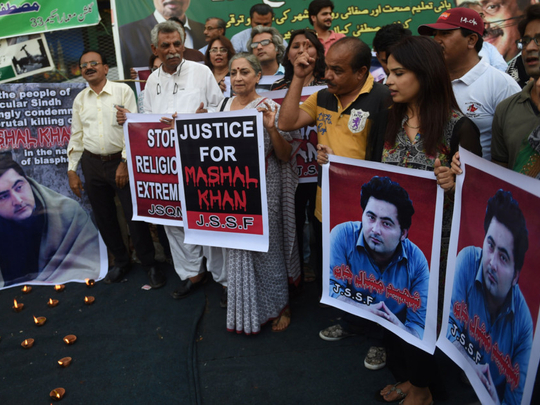
Postmen deal with the delivery of mail. Chefs deal with preparation of food, which sustains our existence. However, self-appointed guardians of faith deal with the pursuit, capture and lynching of blasphemers, which tyrannises society. When such hoodlums and bullies roam free in a community, it behoves you and me look at the heavy price exacted from us all.
The case of Mashal Khan is now well-known. The 23-year-old journalism student in Mardan city in Pakistan was fatally beaten and shot on April 13 by an enraged mob comprising his fellow-students who were incited by rumours that he had blasphemed against Islam. It now transpires that the accusation was false and the police have declared that there is no evidence to support the claim, that in fact the victim was assaulted for his campus activism and liberal views.
Details of the slaying are at once gut-wrenching and revolting. Video footage of the incident showed Mashal, after being shot and killed in his dorm room, lying on the floor, surrounded by men who could be seen stomping on his lifeless body and beating it with planks. True, the case has generated widespread condemnation across the country and the Lower House of parliament passed a resolution decrying the murder — which is cold comfort to the victim’s family — but let’s face it. In Pakistan nowadays, even a hint that a man has blasphemed almost always means either death or, if the accused is lucky enough to escape, a life on the run.
Since the mid 1990s, dozens of people have been violently killed at the hands of vigilantes after spurious blasphemy charges were levelled against them.
Look at this dystopian image, evoked in a news report by Pamela Constable, the Washington Post’s correspondent in Pakistan, last Thursday, from which I am compelled to quote at length. “The outrage over Khan’s killing did little to slow what is becoming an epidemic of anti-blasphemy vigilantism. Three days after his death, three sisters in a Punjabi village, carrying guns and wearing burqas, killed a man who had just returned to Pakistan 13 years after they said he had committed an act of blasphemy.”
Storming the station
Then Constable added: “And Friday in the remote northern Chitral region, hundreds of worshipers attacked a man after weekly prayers and accused him of blaspheming in the mosque. Police took him into custody, but people stormed the station house and demanded that he be handed over. Police officials, who said the victim might be mentally impaired, had to use tear gas and fire into the air to disperse the mob.”
True, blasphemy is not a joke. Islam, Christianity and Judaism enjoin against it. The Quran, for example, admonishes blasphemy, but does not specify any worldly punishment, though in the Hadith punishment of some kind, including death, may be meted out — but only in cases where treason is involved and the interests of the Umma, or the Muslim commonwealth, are harmed, especially during times of war.
The New Testament is equally tough on transgressors. We read in Mathew (12.31): “Therefore I say to you, every sin will be forgiven men, but blasphemy against the Holy Spirit will not be forgiven men.”
And the Old Testament does not equivocate on the capital punishment that awaits blasphemers. In Leviticus (24:13-16) we read: “Whoever blasphemes the name of the Lord shall surely be put to death.”
An exercise in bad taste
And, yes, you may be among those who view blasphemy in this “modern world” as no more than something ranging from an exercise of one’s First Amendment right to an exercise in bad taste, say as evinced in the 2015 Charlie Hebdo cartoons or in the surrealistic fiction of the Satanic Verses in 1988.
Or you may be among those who view it more seriously. Each to his own. But both camps will agree that vigilante justice is a curse.
It is people like that, along with the Caliphniks from Daesh (the self-proclaimed Islamic State of Iraq and the Levant) and the terrorists from Nice, who have made it difficult for the culture of the West to understand the culture of the East. Is it any wonder, then, that to this day, the English language and its critical vocabulary have developed no precise equivalent expression corresponding to, say, “allahu akbar” and “jihad”, translating them cheaply and facilely as “God is great” and “Holy War”?
Well, I tell you, blasphemy is to say that you can kill in the name of God, as if He needs the help of those semi-literate oafs to protect His name from slander and mete out retribution on His behalf.
Fawaz Turki is a journalist, lecturer and author based in Washington. He is the author of The Disinherited: Journal of a Palestinian Exile.












